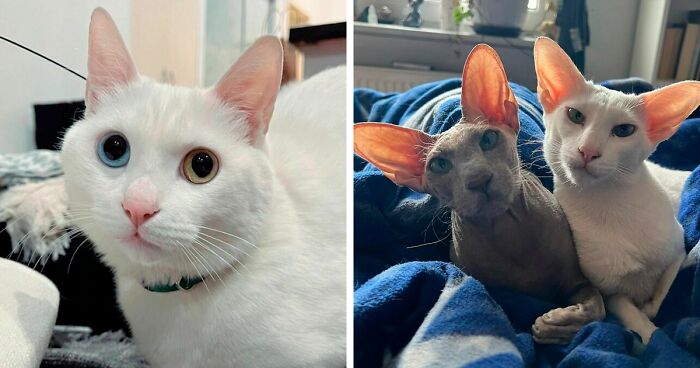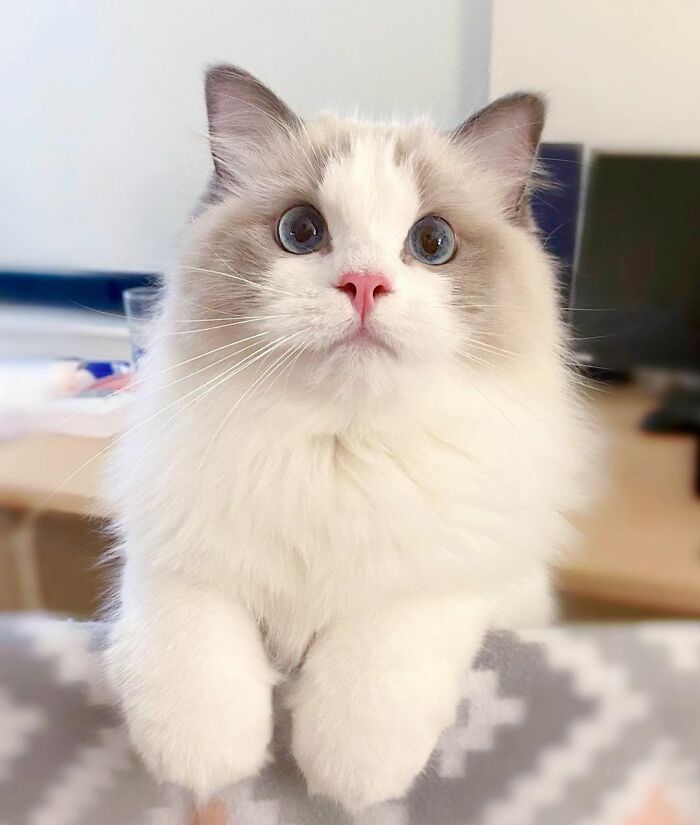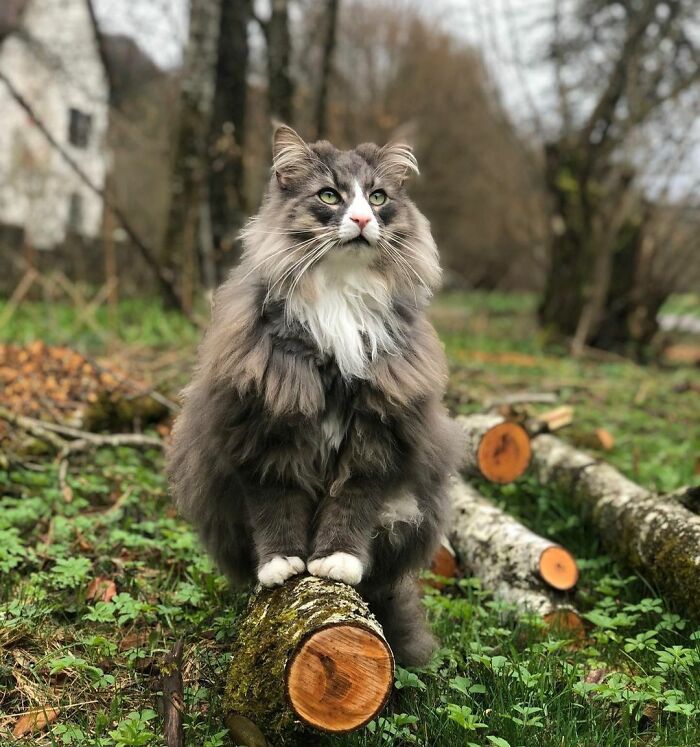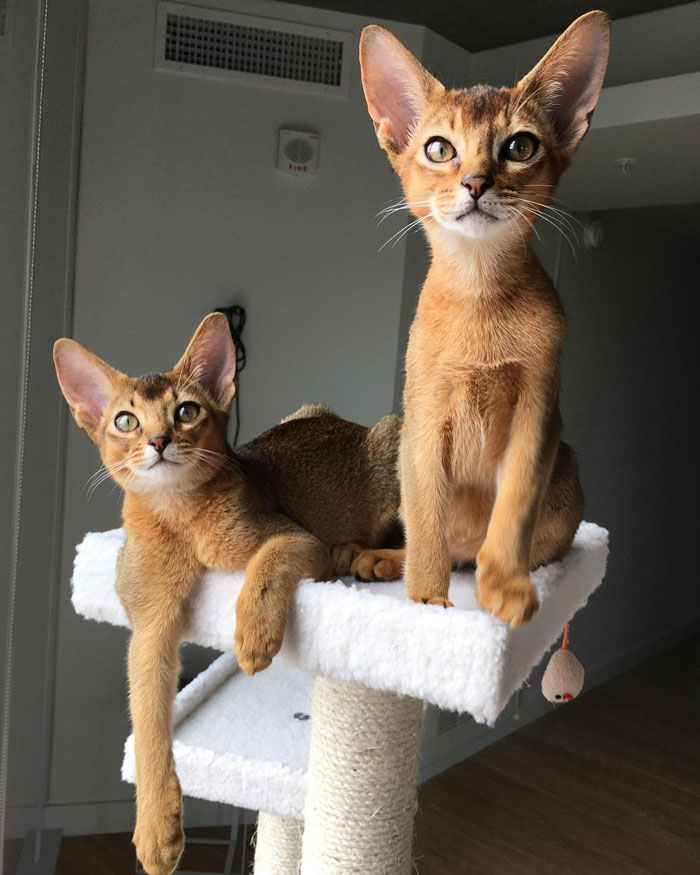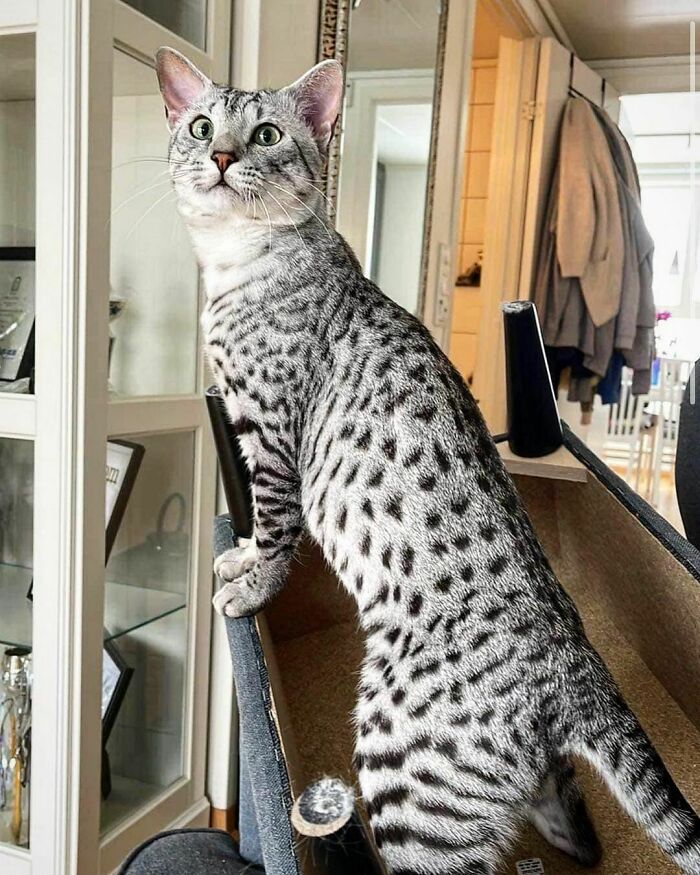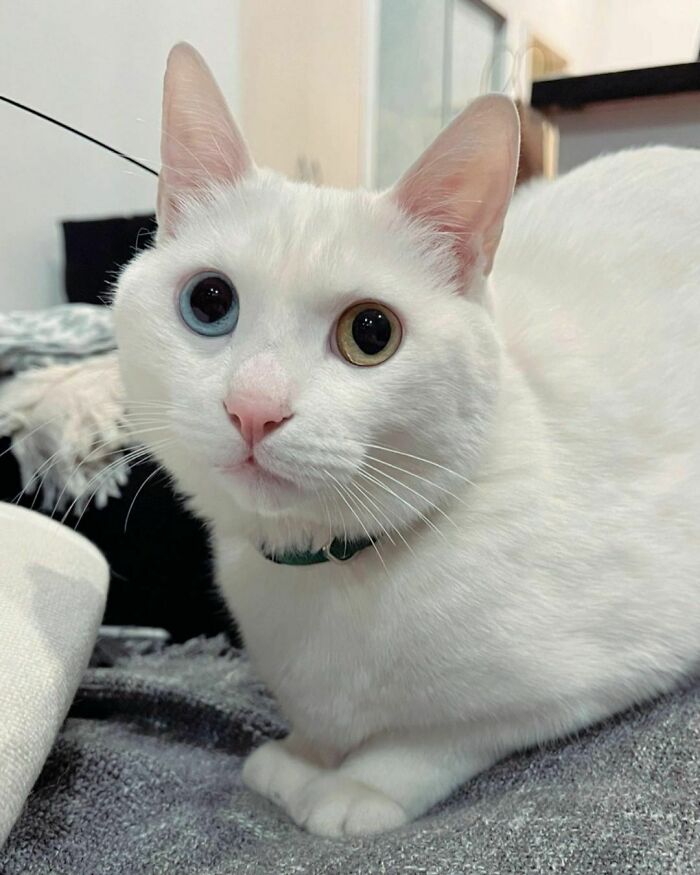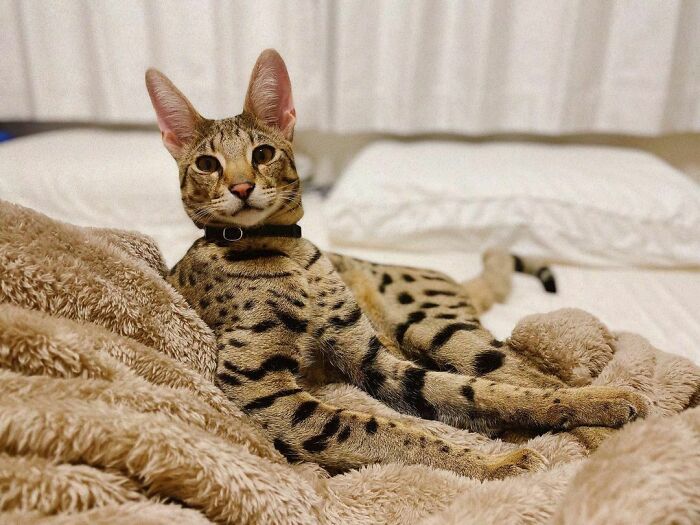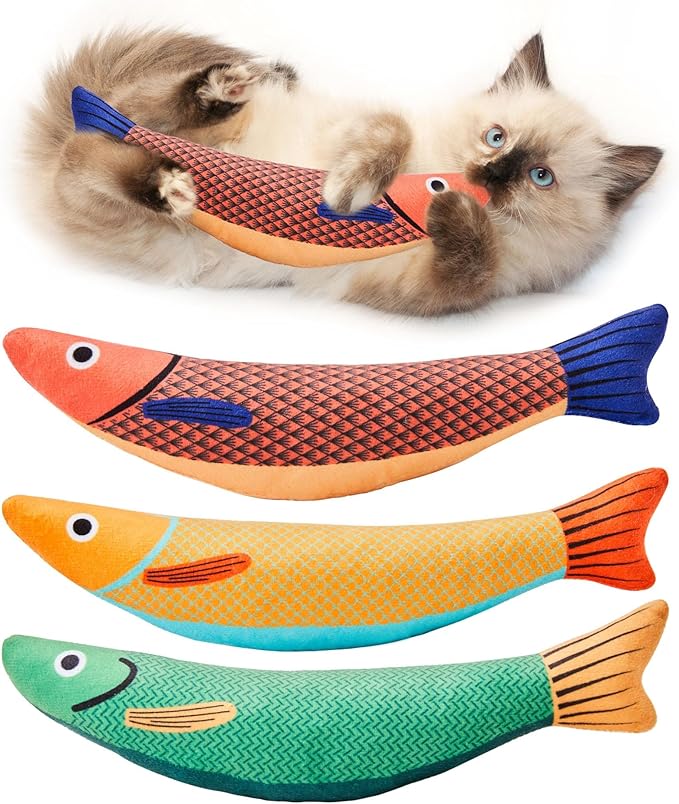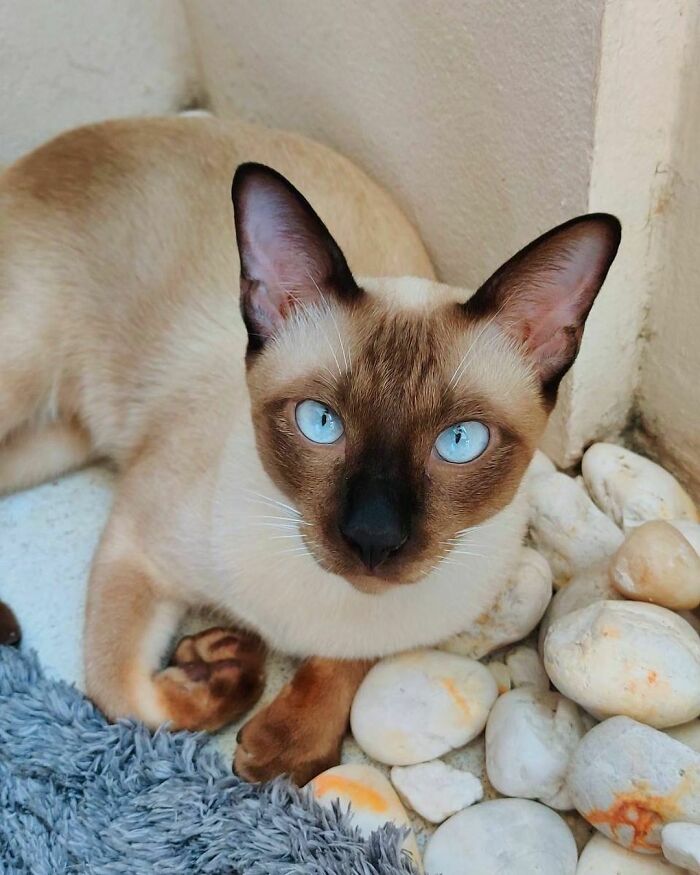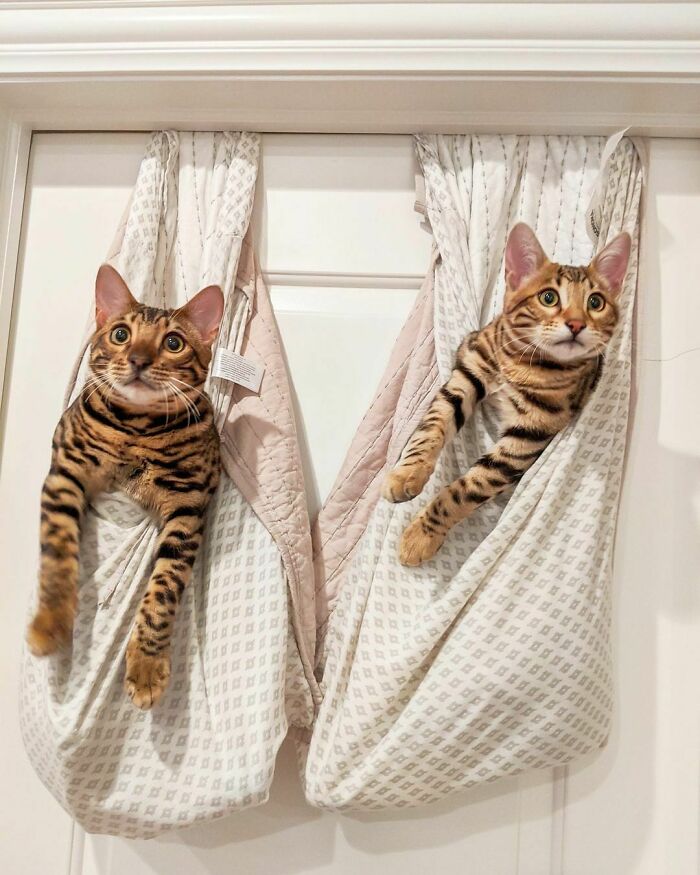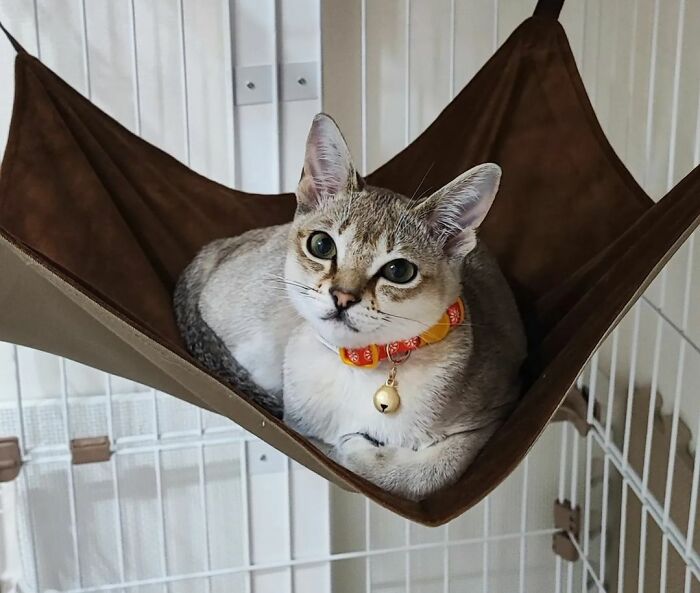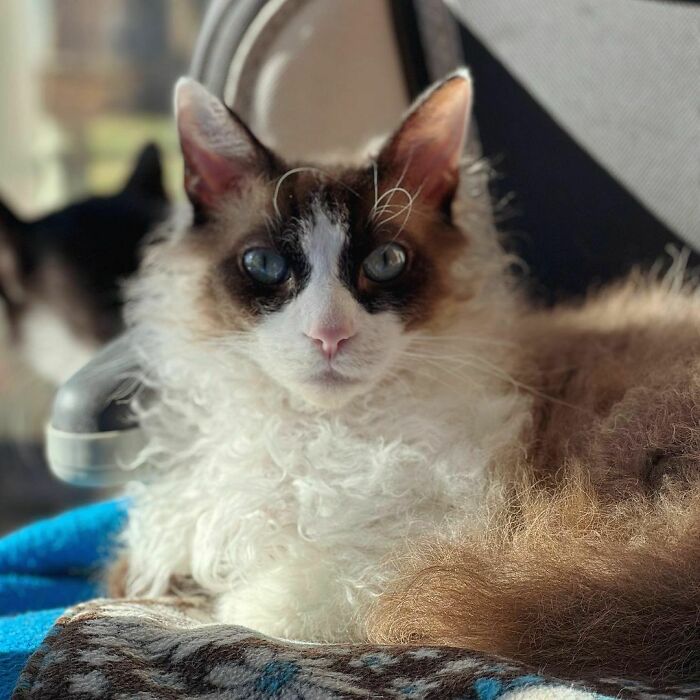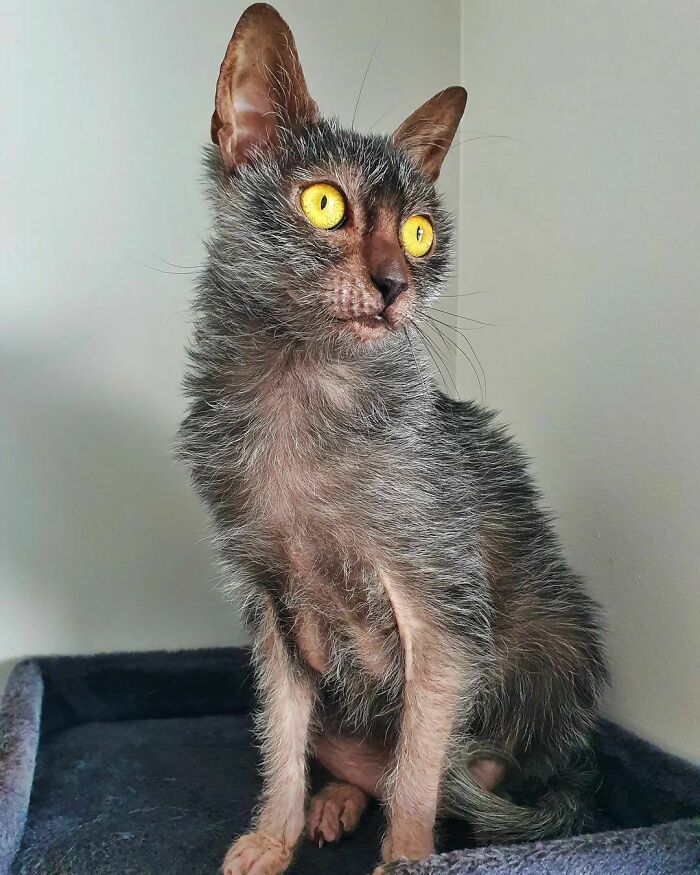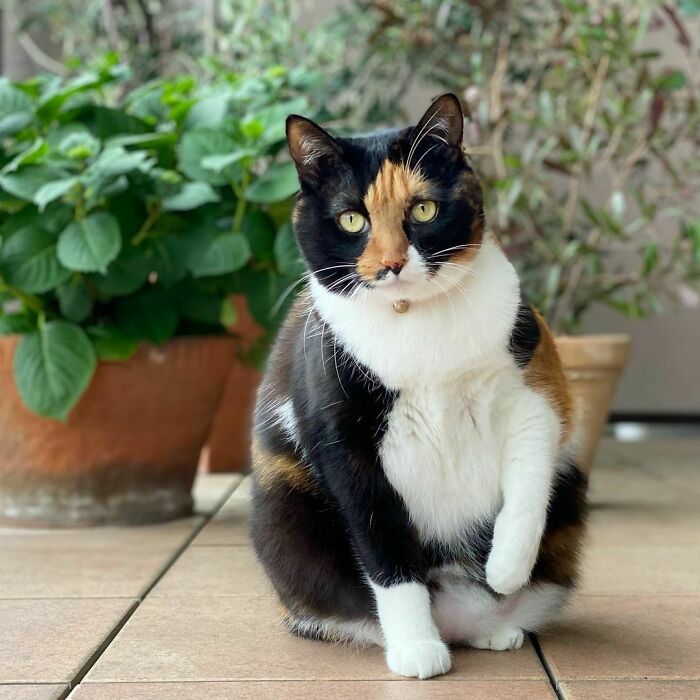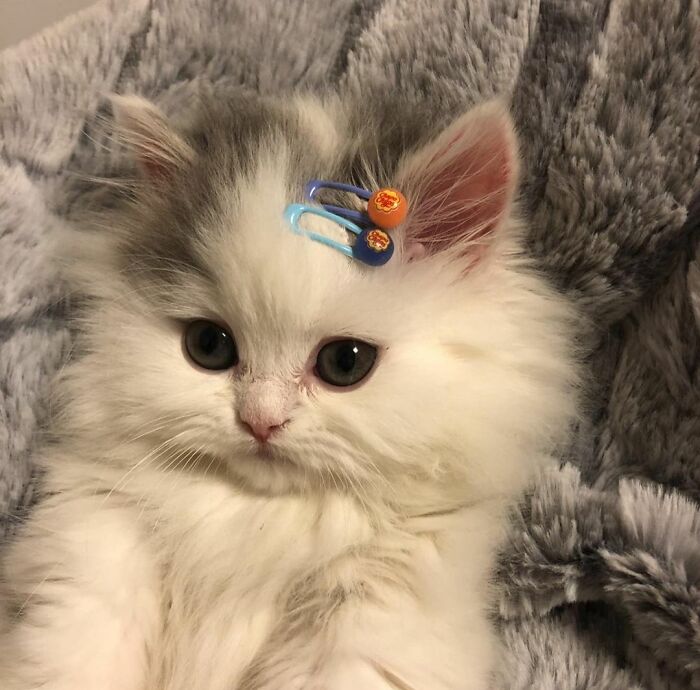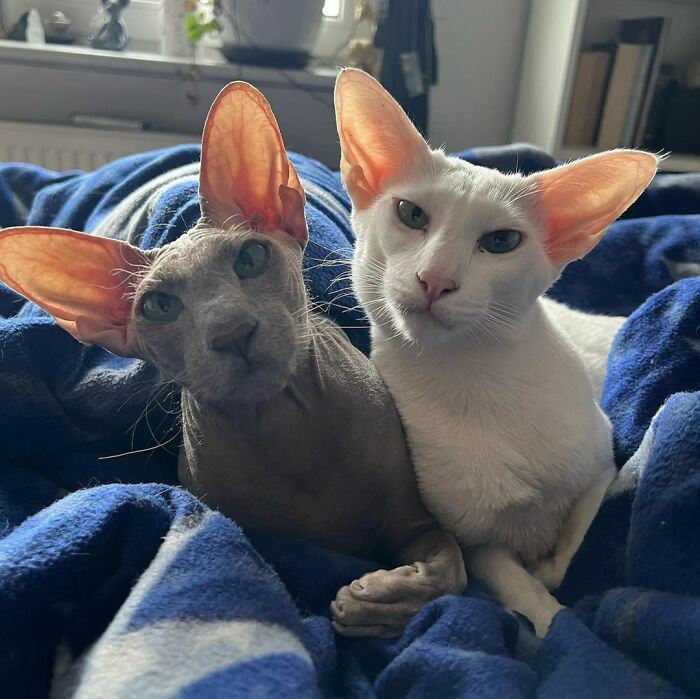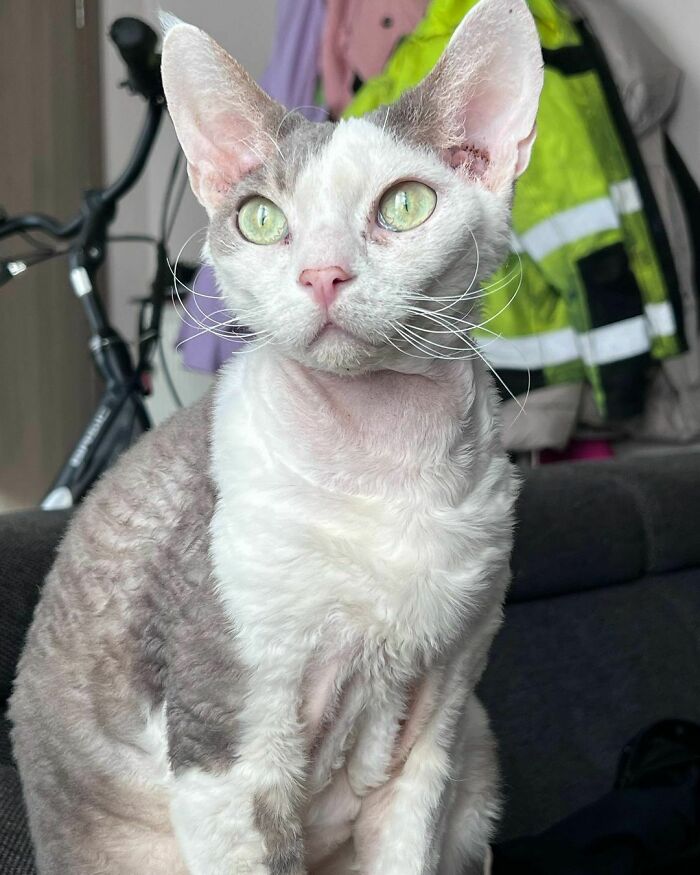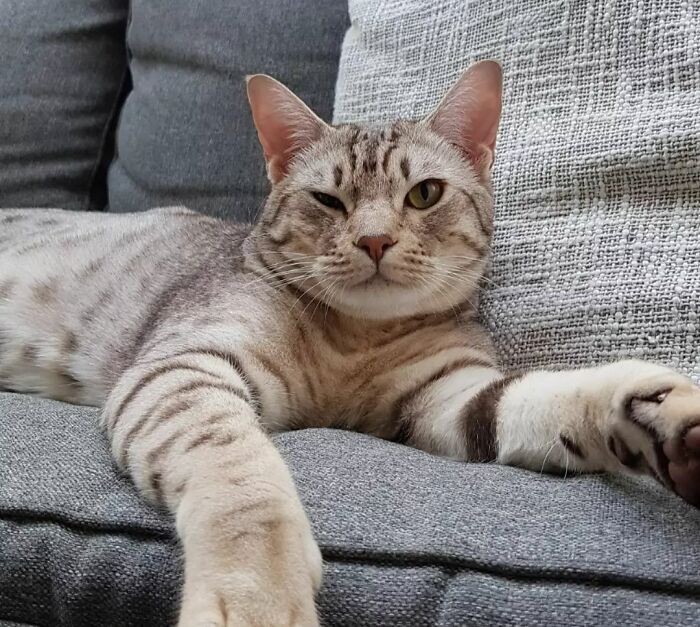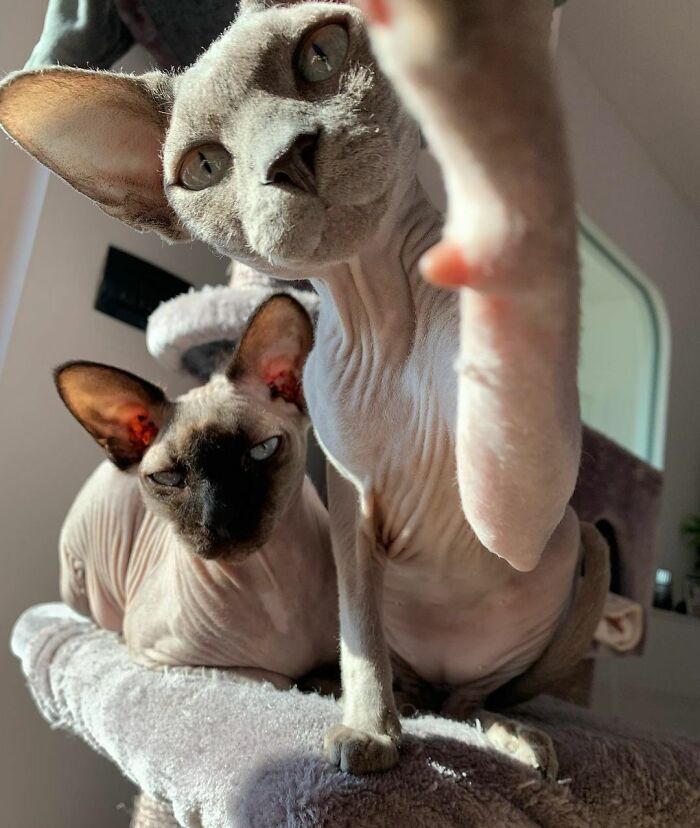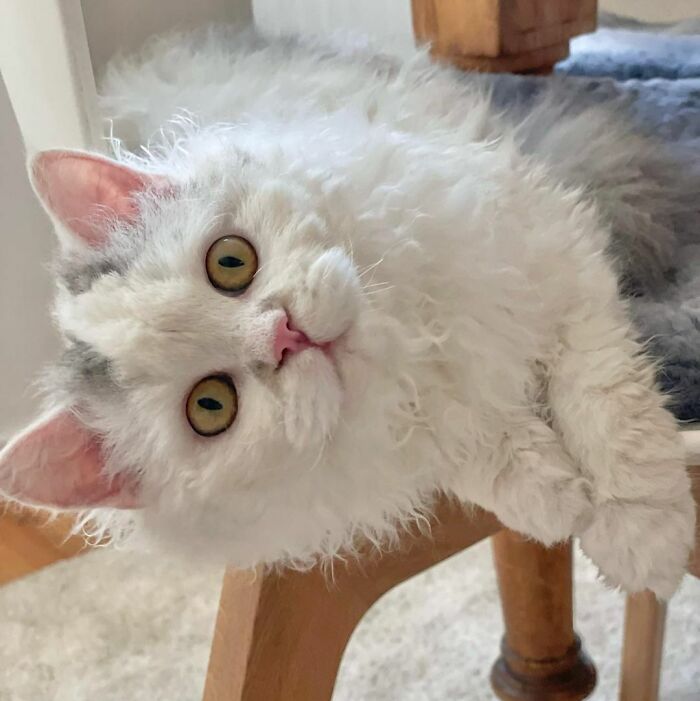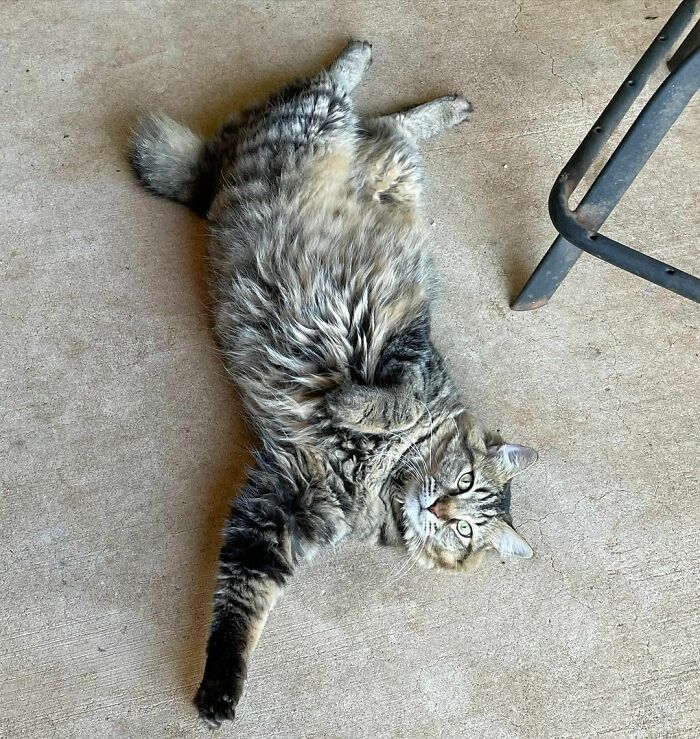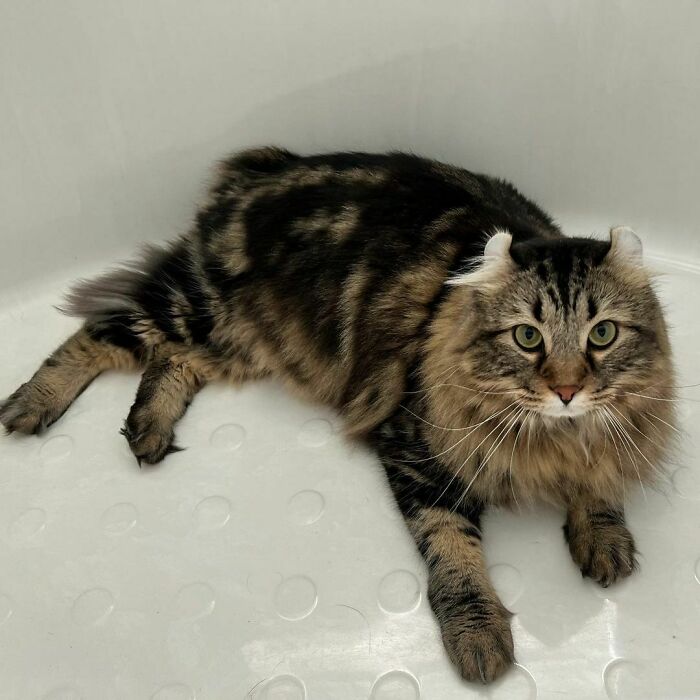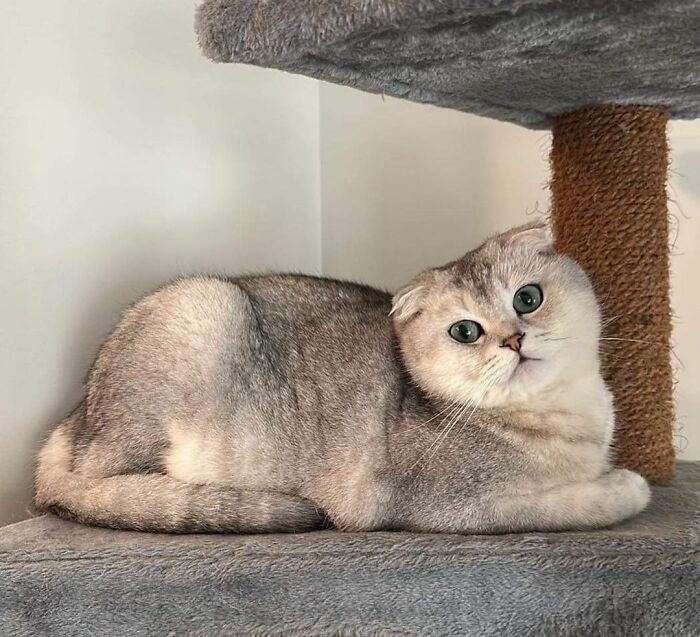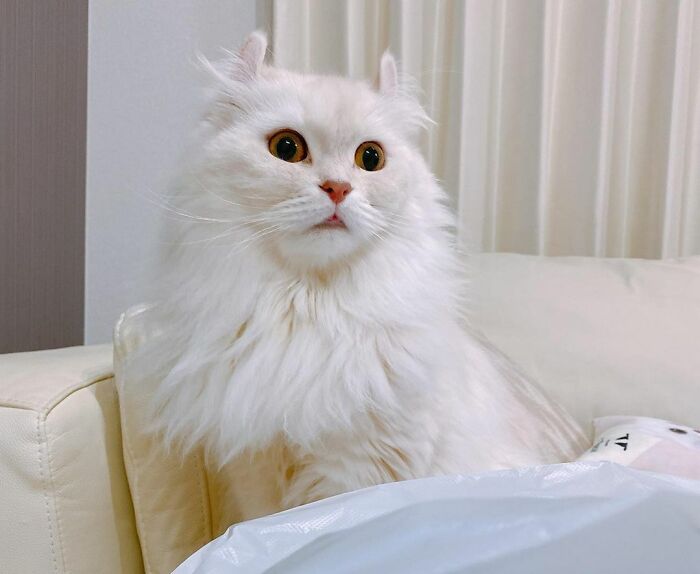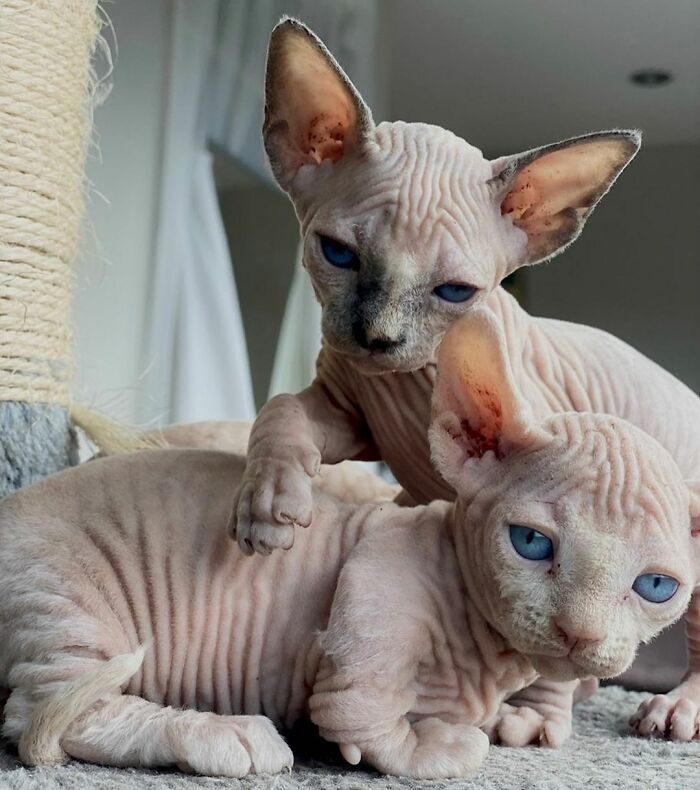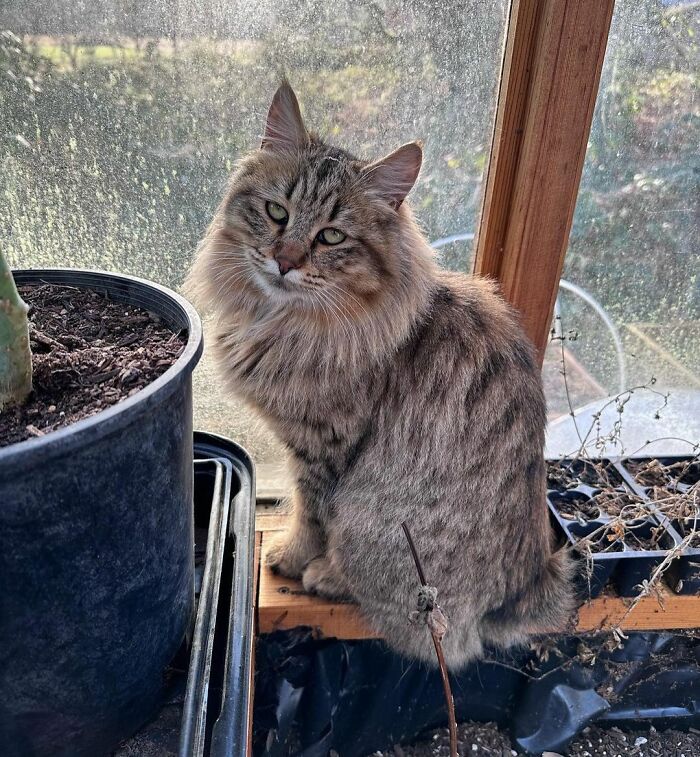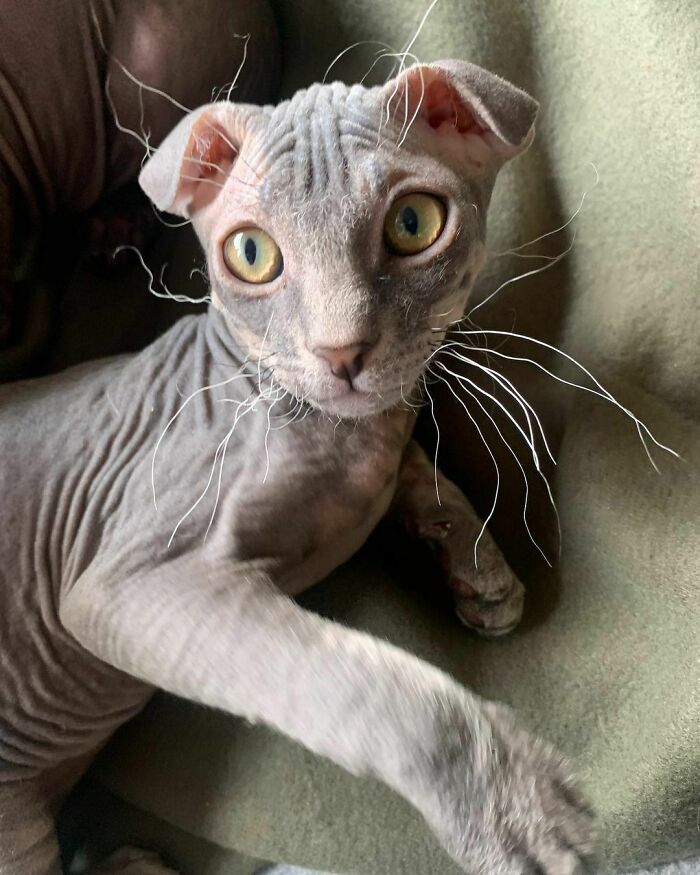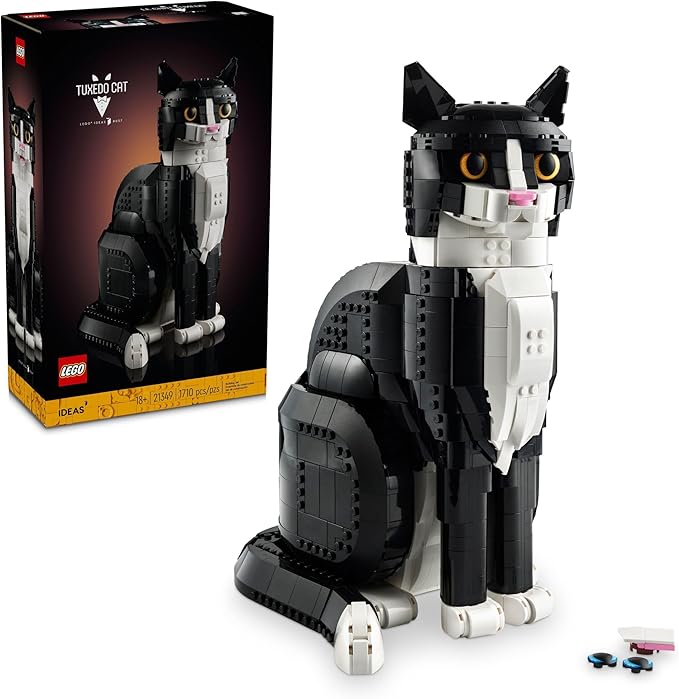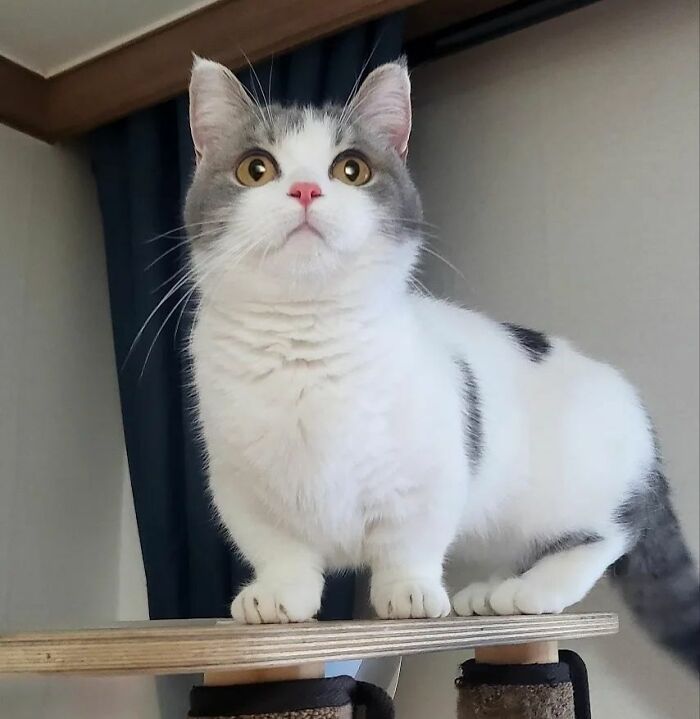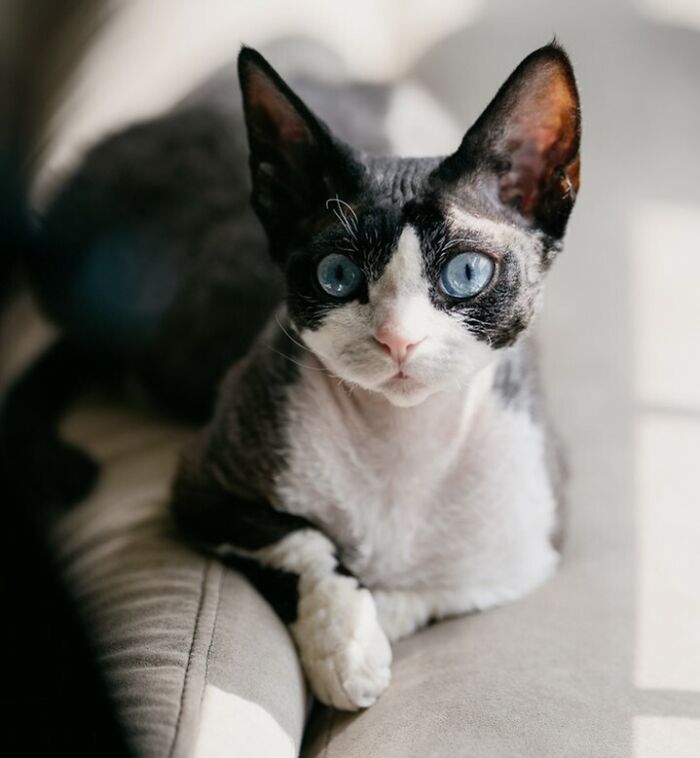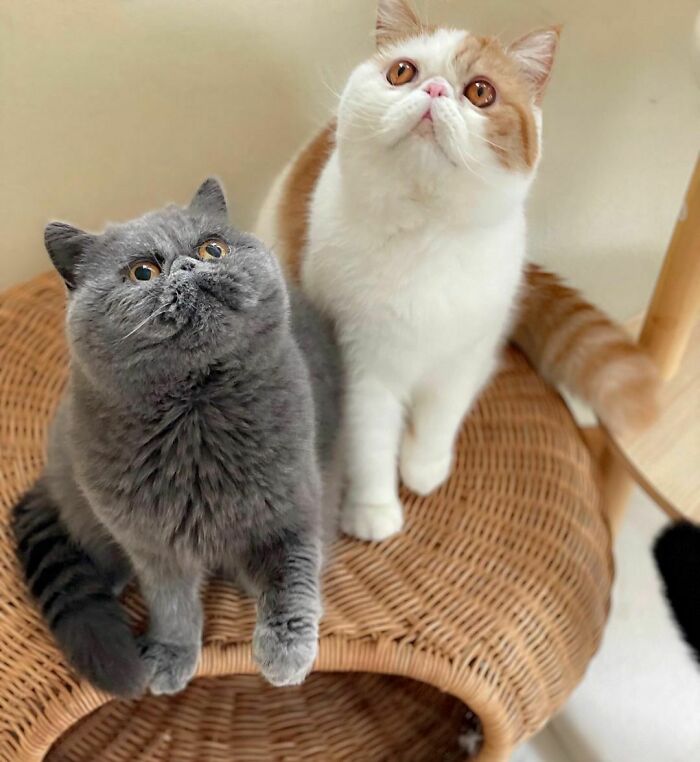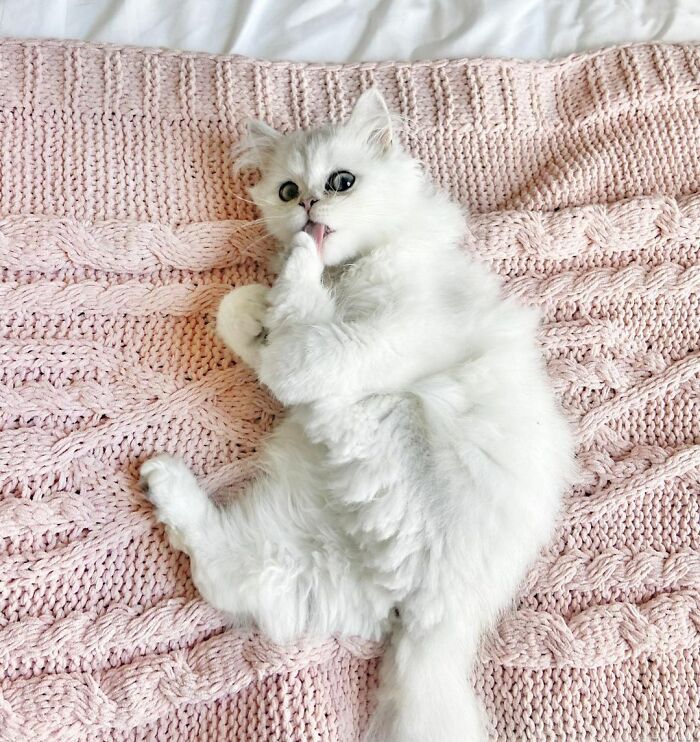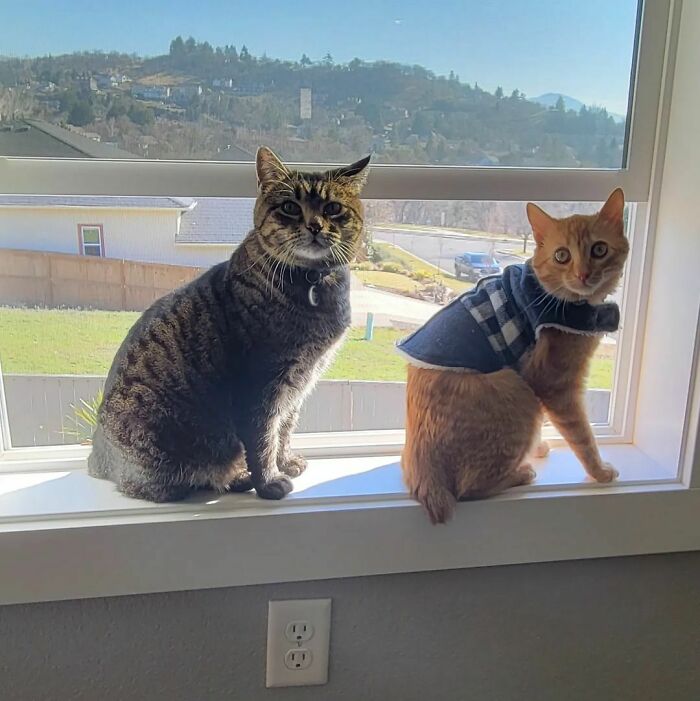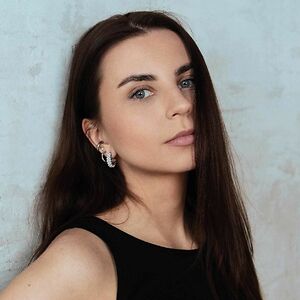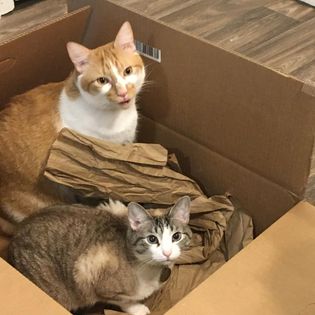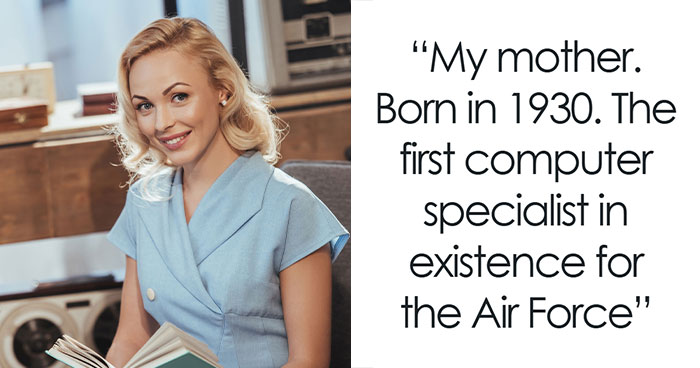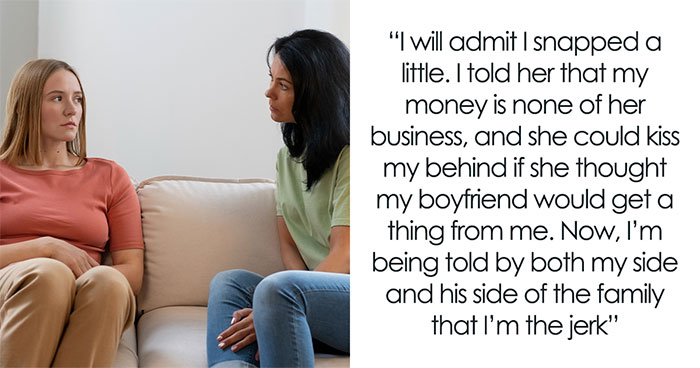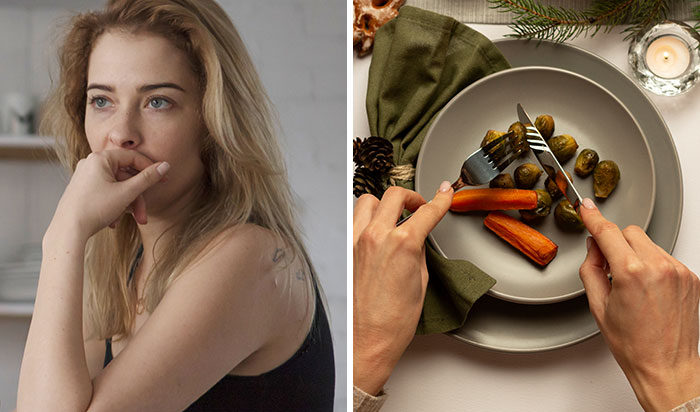There you are, scrolling through your social media feeds, getting lost in a sea of sameness — yet another grumpy-faced tabby, yet another domestic shorthair caught unceremoniously in a box. Cute? Undeniably! But don't you ever yearn for a bit of feline diversity in your life? If you’ve been feeling the itch for a more extraordinary, eclectic cat experience, this is the moment to learn more about different cat breeds.
That’s where we, your feline-obsessed friends at Bored Panda, come in. We’ve done some digging to bring you something a little... scratch that, a lot different. Our mission? To introduce you to some of the most different types of cats out there. Because the world is finally ready to know more about some unique cats that deserve their time in the limelight, too.
These rare cat breeds are anything but your average tabby. From the uncommon cat breeds that are age-old legends to the ones that have only recently stepped into feline fame, we’ve got a diverse lineup that’s just waiting to purr its way into your heart. These unique cat breeds are all about breaking the stereotype of "just another house cat." They are quirky, they’re distinctive, and they’ve got cattitude to boot!
Our exclusive selection will pump your brain with facts about rare cats (or at least, cats that are not exactly the most common), hopefully leaving you longing for more. When you’re done, we would love to hear which of these purr-fectly unique cat breeds has captured your heart. So, don't be shy, and let us know in the comments below. Are you a fan of the regular fluffball, black cat or do you prefer a cat that stands out from the crowd? Let the cat debate begin!
This post may include affiliate links.
This post may include affiliate links.
Ragdoll
Radiating an irresistible charm, the Ragdoll cat is renowned for its striking blue eyes and playful yet easygoing behavior. These feline friends are famous for their floppy, ragdoll-like posture that makes them go limp when picked up by their humans. Known for their unwavering loyalty, Ragdolls eagerly greet their owners at the door and share a harmonious coexistence with both children and dogs. Their tranquil disposition and insatiable craving for affection make them comfortable even around strangers, enhancing their appeal as the perfect family pet.
Norwegian Forest Cat
The Norwegian Forest Cat is a living piece of folklore that originates from the frosty landscapes of Norway and possibly the fabled companions of Vikings on their seafaring raids. Their lush, voluminous coats are naturally designed for the icy Scandinavian climes they're accustomed to.
Abyssinian
With an Abyssinian cat, expect an unbreakable bond of friendship. Always ready for a fun-filled adventure, these energetic felines enjoy being in your company. With small faces and large, almond-shaped eyes, it shouldn't surprise that we decided to include them among unique cat breeds. Notably intelligent, Abyssinians are agile climbers — so an outdoor garden or a cat tower is a great fit. Above all, they cherish their human family, making them affectionate companions.
Abyssinians are gorgeous kitties! Also google "Somali cat" to see a beautiful breed that is basically the longhaired version of the Abyssinian, with poofy tails you'll want to pet right through the screen XD
Egyptian Mau
Sporting an elegant spotted coat and a historical lineage, the Egyptian Mau is an exceptional breed that brings exotic charm to any home. With their medium-sized yet muscular bodies, longer hind legs, and high-speed agility, they're the speedsters of the domestic cat world. Their sensitivity to cold climates makes them ideal for warmer environments. Their lively nature benefits from a spacious outdoor area. Loyal, cheerful, and affectionate, Mau cats are perfect for those seeking an energetic companion who also enjoys a good snuggle.
Khao Manee
Hailing from Thailand, the Khao Manee, also known as Khao Plort, is a unique breed featuring a pristine white coat and jewel-toned eyes, often of differing colors. Treasured for their luck-bringing reputation, they thrive on attention and are well-suited for families.
While they may sport patterns as kittens, they achieve a pure white coat by 18 months. Their striking eyes, muscular, lithe bodies, and chatty, social nature make them highly sought-after. However, they crave constant companionship, meaning they may not suit owners who are often away. Regardless, this rare and precious breed offers a unique, rewarding pet experience.
This breed may have been mentioned in the "Tamra Maew", or "Cat Book Poems" - manuscripts from the 1700s - 1800s that are basically primitive "breed standards" for Thai cat breeds/colors that were considered "auspicious" - that's my kind of book! XD
Savannah
The Savannah Cat is a testament to the wild beauty of the African plains, being a crossbreed of a domestic cat and the medium-sized serval, a native African feline. This magnificent breed claims the title of the tallest domestic cat, potentially weighing up to 30 pounds. You can easily distinguish it by its large ears, dark tear stands, and markings reminiscent of a cheetah.
No, no, no! This is not a house pet! It is a gorgeous, wild creature that does not need or very much want humans and should be left outside. Stop selling these lovely creatures along with the lie that they are domestic animals.
Potaroma Cat Toys Saury Fish!!! Buy on Amazon
Siamese
Siamese cats stand out for their stunning blue eyes, triangular faces, large ears, and slender frames. Known for their vocal expressiveness and a resonant meow that's hard to ignore, they also shine with exceptional intelligence and sociability. Their dog-like social demeanor has often led owners to adopt them in pairs to prevent them from experiencing solitude.
Bengal
The Bengal cat's lineage can be traced back to a remarkable blend of domestic cats and the Asian leopard cat, boasting striking gold-spotted coats and a powerful physique. While their wild aesthetic might intimate some, they are incredibly social, nurturing a deep affection for their families, including children and other pets. Certain cities have banned or restricted Bengal ownership due to their wild heritage.
Gorgeous, but very high energy. Like with huskies, owners need to know what they are getting into before adopting this breed.
Singapura
Singapura cats, with their infectious spirits, are all set to capture your heart! These felines, often found basking in the sun or hiding under duvet covers, have a playful and friendly nature. Being among the smallest cat breeds, their cute eyes and oversized ears stand out like a lightbulb in the dark. They're a bundle of energy and curiosity, always ready to chase a ball or entertain you with their playful antics. With a good-natured disposition similar to the Burmese breed, Singapuras are well-suited to indoor living, coexisting harmoniously with other pets.
LaPerm
LaPerm cats belong to the Rex breed, known for their unique curly coat. These full-of-energy cats can weigh up to 10 pounds in males and 8 pounds in females, and there are both short- and long-haired varieties. Their extroverted, intelligent nature makes them an excellent choice for families and kids, bringing a lively presence to any household.
Lykoi
The Lykoi cat, often compared to a werewolf, is as intriguing as it is adorable. Short, lighter fur around their features creates a unique, werewolf-like pattern, amplified by their scraggly salt-and-pepper coat. Their playful, affectionate nature completes their fantastical appearance.
Known to occasionally shed their fur, Lykoi can resemble the Sphynx cat, though they share genetics with Domestic Shorthairs, not Sphynxes or Devon Rexes. Their unusual coats, resulting from a genetic mutation, once raised concerns about potential health issues, but rest assured, these 'little beasties' are totally healthy.
I love these, they look like they could be Disney villains (and I mean that in the best way possible)
Japanese Bobtail
Known in Japan as Mi-Ke, meaning "Three Colors," the Japanese Bobtail is an endearing breed with white fur and orange and black patches. This breed's most striking feature is its rabbit-like short tail. These bobtails are known for their affectionate nature, making them ideal lap cats.
Good job, Bored Panda, for choosing a photo of a Japanese Bobtail that doesn't show its tail :p Additionally, "Mi-Ke" only refers to CALICO cats, of ANY breed, not the Bobtail as a breed. The Japanese Bobtail comes in many other colors other than calico - obviously, since almost all calicoes are female! XD
Minuet (Napoleon)
The Napoleon cat, named for its small size reminiscent of Napoleon Bonaparte, is a charming breed resulting from the union of Persian and Munchkin cats. Rarely exceeding 9 pounds, these cats are known for their sociable disposition, thriving in the company of humans and other pets. With a coat that varies in length and color, Napoleons captivate with their gentle and playful nature, making them perfect companions.
Peterbald
Born in St. Petersburg in 1994, the Peterbald is a distinguished Russian cat breed. This breed, known for its hairless, gray-silver skin, slanted face, and large pointy ears, was born out of experimental breeding between a hairless Donskoy and an Oriental Shorthair.
With its distinctive appearance, the Peterbald quickly gained popularity in Russia. However, their hairless condition necessitates a warm indoor environment and weekly bathing to prevent their coats from becoming oily. Despite these additional care requirements, their loyal, affectionate nature makes them delightful companions. Their energetic and loyal personality, often compared to that of dogs, makes them an engaging presence in any home.
Ever since someone did a comparison to Adam Driver I can't see it now 😅
Devon Rex
Meet the Devon Rex, a breed embodying mischief and affection, also endearingly known as the "pixie cat." Emerging in the late 1950s in England, these cats are sociable companions who enjoy the company of family, children, and other pets. With their slender bodies, long legs, and large eyes, they exude a unique charm. Their love for high places and interactive play, like fetching, calls for stimulating environments with perches or cat trees. Unlike other breeds, the Devon Rex's fur is delicate, so it's better to use a cloth to gently rub it instead of brushing.
Never had the pleasure of meeting one, but I would love to pet one. Very interested in the unique fur texture.
Ocicat
The Ocicat, with its wildcat-like appearance, is an affectionate breed that loves to be at the center of attention. Created from a mix of Siamese, Abyssinian, and American Domestic Shorthair, this breed boasts a smooth coat with multicolored hairs and diverse markings.
Ocicats engage readily with their surroundings, transforming ordinary household items into playful toys. They cherish companionship, welcoming both familiar faces and strangers alike. To keep their sharp intellect and high energy levels satisfied, they require stimulation, possibly from the company of a feline sibling. Fun fact: most of them love water!
My sister had an ocicat named Cleo. Cleo loved my sister, but was a very anxious kitty and did not like me or my cat (in Cleo's defense my cat was a territorial jerk). Cleo had lots of zoomies and was always looking for playtime. Idk about other ocicats, but Cleo HATED water. More than any cat I have ever known. She needed a flea bath once and yowled like we were trying to drown her.
Sphynx
The regal Sphynx, famous for its near-hairless body, is a high-spirited breed that brings joy with its playful antics. Contrary to popular belief, its body is not totally nude but presents a light layer of fuzz. Despite their austere facade, these cats are cheerful acrobats, lighting up their homes with boundless energy and curiosity. Nevertheless, the Sphynx requires attention due to its susceptibility to sunburn and cold. To protect them, indoor living (plus the occasional cat sweater fashion) is advised.
Selkirk Rex
The Selkirk Rex, with its adorable plush, curly coat and expressive, almost smiling face, is truly a 'cat in sheep's clothing.' Their curled whiskers and big round eyes only enhance their appeal. Sociable and attention-seeking, these fur babies love to cuddle and will often follow you around. Despite their luxurious coats, they require only occasional brushing and are not prone to tear duct issues like other flat-faced breeds. They may not be the most active cats, but their gentle nature and love for interactive play make them the perfect lap companion for quiet evenings.
American Bobtail
American Bobtails, with their short tails, tufted ears and toes, and short necks, look like they were made for cuddles. Initially a feral cat, the breed began its domestic lineage in the 1960s, emerging as a playful and friendly companion for families.
Exhibiting a similar personality to that of a golden retriever, these cats are loyal, interactive, and incredibly nice with strangers. Their intelligent and inquisitive nature makes them fond of puzzles, games, and fetching. The adaptable and easygoing American Bobtail is a curious explorer who happily embarks on travels and outdoor excursions.
Nope - the American Bobtail originated in a spontaneous mutation found in the regular ol' domestic cat, not a "feral cat". The original Bobtail was a tabby named Yodie. Interestingly, the American Bobtail's bobbed tail is a dominant trait, whereas the Japanese Bobtail's bobbed tail is a recessive trait! They are two separate tail mutations :)
Highlander Cat
The Highlander cat captivates with its exotic allure, marked by a short tail and uniquely curled ears. This beautiful feline is partially descended from wild-domestic hybrids.
Scottish Fold
Equipped with unique folded ears that give them an almost earless appearance, Scottish Folds cut a memorable figure. Their round faces and large, circular eyes contribute to their charmingly owlish expression. The breed owes its distinct look to Susie, a cat from Scotland, discovered by a shepherd in 1961, who had the breed-defining folded ears.
Adorable, but another purebred with TONS of health problems, some of them quite severe and painful. Literally ALL Scottish Fold cats are affected by osteochondrodysplasia, a developmental abnormality that affects cartilage and bone development throughout the body. This condition causes the ear fold in the breed. Scottish Fold cats therefore have malformed bone structures and can develop severe painful degenerative joint diseases at an early age. Due to these health conditions, breeding Scottish Fold cats is prohibited in several countries and some major cat registries do not recognize the cat breed. The Scottish Fold is a lifelong favorite of mine and when I was a kid, I was determined to have a Fold once I grew up. I wanted to crossbreed a Fold to a Manx to get a "totally round cat" Now, I am much better educated about cat (and dog) breeds and their health issues, and I could never in good conscience condone the breeding of either :(
American Curl
The American Curl, named for its uniquely curled ears, is a cheerful breed known for its affectionate and chatty demeanor. Originating from a particular genetic mutation, this relatively young breed is known for its curiosity, intelligence, and love for human company. A perfect fit for families, Curls display their affection with adorable head bumps and leg rubs. With a high activity level that persists into their senior years, the American Curl is an adaptable and engaging pet.
The Dwelf
The Dwelf is a recent breed with a unique combination of elf-like features and dwarf stature. Weighing no more than 9 pounds, this hairless breed was developed through a mix of the Sphynx, Munchkin, and American Curl breeds. Their sociable nature, often likened to that of dogs, makes them perfect companions. Dwelfs appreciate human company and enjoy participating in family activities, making them a great addition to any family.
Munchkin cats are literally purposefully-bred to have achondroplasia (dwarfism.) Munchkin cats have a TON of health problems. Many pedigree cat associations around the world have refused to recognize the Munchkin cat as an official breed, due to the severity of the health issues. Breeding of Munchkin cats is prohibited by law in several countries due to these genetic health concerns. DO NOT buy Munchkin cats, or their mixed-breed "derivatives", just because they are "cute" :(
I'm sorry, all I am thinking is "recessive traits, recessive traits, recessive traits". These cats must have a myriad of health problems. Hopefully no one gets them who doesn't want to spend 10 or $20,000 in vet bills over the span of 10 years.
Pixie-Bob
Reminiscent of a wild bobcat yet domestic in size, the Pixie-Bob breed is distinctive and intriguing. The breed's standout traits are their bobbed tails and propensity for polydactylism (polydactyl cats have extra toes on their feet), adding another layer of fascination to their wild-at-heart appeal. Their breeder Carol Ann Brewer contends that their origins trace back to naturally occurring bobcat hybrids.
"Naturally occurring bobcat hybrids" - haha, no. There have never been ANY proven lynx/bobcat + domestic cat matings. Zero proven hybrid offspring. The Pixie-Bob was bred to resemble bobcats, but it is not a bobcat hybrid, nor were any of its ancestors actual bobcats. There is too great of a gestational difference between bobcats and domestic cats, and this mismatch would cause similar issues that face Savannah breeders - i.e., the bobcat's gestation time is longer than a domestic cat's, and if a domestic cat were to birth hybrid offspring, they would inevitably be "premature" when reckoned by the bobcat parent's gestational period, leading to decreased kitten survival rates.
Ukrainian Levkoy
The Ukrainian Levkoy, a relative newcomer recognized only in 2005, is a unique breed characterized by its minimal hair and distinctly folded ears. Its rarity might explain why it's not widely known, but its distinctive look ensures it's not easily forgotten once seen!
Tuxedo Cat! Buy on Amazon
Munchkin
Since their debut in the 1990s, Munchkin cats have become renowned for their short-legged stature reminiscent of dachshunds. This characteristic has sparked controversy among breeders, with some hesitant to officially recognize the breed due to potential health concerns. Despite this, their peculiar look has earned them a unique niche in the feline world.
Munchkin cats are literally purposefully-bred to have achondroplasia (dwarfism.) Munchkin cats have a TON of health problems. Many pedigree cat associations around the world have refused to recognize the Munchkin cat as an official breed, due to the severity of the health issues. Breeding of Munchkin cats is prohibited by law in several countries due to these genetic health concerns. DO NOT buy Munchkin cats just because they are "cute" :( They will likely have lifelong health problems and likely be in pain for a portion of their lives.
Minskin
The Minskin, first developed in Boston in 1998, is a distinctive breed with a stocky body and short legs. This breed was developed by crossbreeding a Munchkin cat with a Sphynx to ensure a healthier immune system. This breed rapidly rose in popularity, with 50 officially recognized Minskins by 2005.
STOP with the Munchkin crossbreeds, holy c**p! Munchkins literally have dwarfism and are at increased risk for lordosis, pectus excavatum, and osteoarthritis.
Exotic Shorthair
With their low-maintenance coats, Exotic Shorthairs are often called the 'laid-back' version of Persians, offering the same endearing facial features but with less grooming demands. This medium-sized breed forms strong bonds with its humans, demonstrating its affectionate nature with both humans and other pets. Despite their relatively low energy levels, these cats have a playful streak, contentedly engaging with interactive toys. Their easygoing temperament and minimal grooming needs make Exotic Shorthairs a top choice for first-time owners.
Unfortunately, the Exotic Shorthair is a brachycephalic breed, and is prone to almost all of the same health issues that brachycephalic dogs such as Pugs and Frenchies have. Just be advised that they can have many serious health issues before adopting one!
Teacup Persian
Not a separate breed but a variant, the Teacup Persian is the result of breeding Persians to be extremely small. Some are small enough to nestle into the palm of your hand, thus their name. However, this breed has sparked debate about the potential health complications of breeding such small sizes.
"Teacup" and "Toy" are terms that are considered controversial and/or marketing ploys, as cats do not have the genetic mutations that dogs possess to produce miniature versions of themselves, as cats have a strong genetic buffering mechanism that keeps the genes from mutating. Unscrupulous breeders have resorted to harmful and repetitive inbreeding to obtain smaller cats, resulting in genetically weaker cats often with severe health issues and shortened lifespans. DO NOT buy a "teacup" Persian just because it is tiny, palm-sized, and cute - you will probably be purchasing a cat who will suffer from many health issues, and will likely be in chronic pain at some point in its life. It is absolutely disgusting and abhorrent what people do to breed cats that appeal to people because they are "tiny" or "cute", because these unscrupulous breeders do not give a single shít about the cats' welfare or health, or the suffering they will endure, or the cost and emotional suffering to the owners.
Manx
The long-haired Manx cat, often referred to as a "cabbit" due to its absent or short tail, is a breed that can't help but make people curious. Although there's no biological basis for the legend of it being a cat-rabbit hybrid, the idea persists due to its unique appearance. Their dense, plush coats make them fantastic lap cats.
Another breed that is sadly predisposed to arthritis and other issues due to its tail mutation. It is also a "lethal" homozygosity - you cannot breed two tailless Manxes together, as the offspring will all die while still in the womb (miscarriage). A tailless Manx must be bred to a tailed Manx in order to result in viable offspring. I love Manx cats dearly and wanted one when I was a kid (I wanted to breed one to a Scottish Fold!) but they can be prone to many health issues including bowel and bladder problems, and spinal problems. On a happier note, Google the longhaired variety - called the Cymric - to see some truly gorgeous floofs!
In the world of unique felines, one mustn't overlook a particularly captivating breed with an extraordinary appearance. As our exploration of diverse cat breeds suggests, some of these cats possess traits that set them apart from typical domestic companions.
If the tale of a certain striking Persian cat has piqued your interest, you might want to explore more about this fascinating creature who has garnered admiration across social media.
Please educate yourself about ANY breed's health problems before you adopt. Many "cute" breeds are the result of massive mutations, and these mutations often lead to severe health problems and/or pain and discomfort for the duration of the cat's life. Additionally, it's worth noting that cat breeds DO NOT work like dog breeds - meaning you don't get a "Siamese-Bengal" or a "Siengal" when you breed a Siamese and a Bengal, you get a "domestic shorthair". Mixed-breed cats are just that - mixed-breed cats. If your cat had a purebred Bengal for one parent and a domestic shorthair for the other parent, your cat technically isn't "half Bengal", it's a "domestic shorthair". Many of the "mixed breed" cats on this list are NOT officially registered breeds that are accepted by cat associations - they're just mixed-breed cats that breeders have taped a clever name onto (Like the Minuet and the Minskin.)
I came here to say this, so I'll add a little more specificity: a cosmetically small deviation is often not only present in that one small deviation. For instance: the Scottish Fold has a mutation that causes osteochondrodysplasia, or the malformation of cartilage that causes the folding of the ears. This means that these cats have malformation of ALL cartilage, not just the ears, and will cause them varying degrees of pain and discomfort throughout their lives. This goes for all Scottish folds, not just the ones that have flatter ears than the other one. Knowing this, imagine what Munshkin cats have to go through, as they have severe abnormal growth of their legs. Just because a cat doesn't show you its in pain, doesn't mean that it isn't in pain. Purebred white cats like the Khao Manee are often deaf. The list goes on. Also, a cat is not a characterless-animal that you can throw into a room and then leave alone for a few days. Invest in the happiness of your cat! Lastly: you taking good care of your pet does not justify you having an African Serval walking around your home. "But he's happy and well taken care of!" That doesn't change the fact that it's not supposed to be inside your house.
Load More Replies...As adorable as they look please ADOPT your pets from shelters. Not only are they cheaper initially, they are less likely to have a lot of the genetic disorders and health problems purebred cats have that cost a lot to treat. Plus you'll feel great for giving a pet in need a loving home!
Ima just leave this here, in case there's anyone out there that thinks you can't get a ridiculously cute and magnificently glorious floof from a shelter XD Behold Preacher, formerly "Miller" of OC Animal Care in Tustin, California! IMG-8031-1...c286a3.jpg 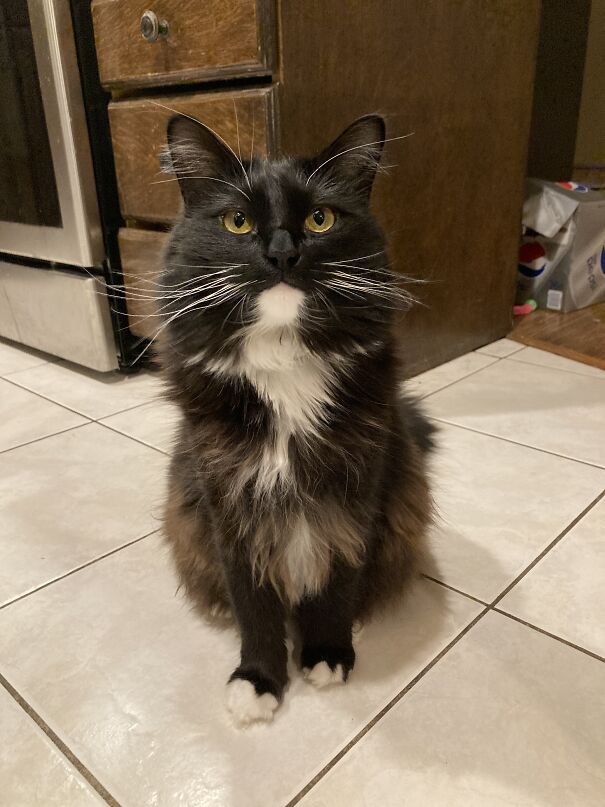
they forgot bass guitarist! heres a pic: bcno-64726...520b50.jpg 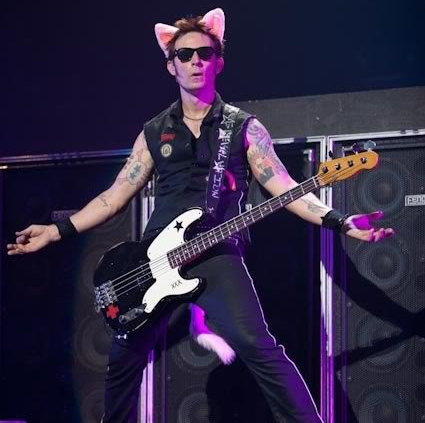
This is Bella, our Turkish Van, adopted from an RSPCA facility in 2009. She is 16.5 yo, has hyperthyroidism & is now fully recovered from an excess of calcium in her blood that necessitated a 24-hour stay on a drip in an animal hospital. She has since had anaemia due to blood in her urine, which required weekly doses of vitamin B12 for 6 weeks. We now give her an injection every 4 weeks. She takes daily medication for her hyperthyroidism & a small dose of steroids every second day. She is back to her normal weight of 3.9kg & our amazing Vet is very satisfied with her health now & thinks she may live for another 2 or 3 years without any further health issues. We spoil her rotten & she spends a good part of every day sleeping in her padded house in our living room or on my wife's lap. Occasionally, she'll condescend to sleep on me. She spends her overnights in the laundry curled up in an identical house with a heated pad underneath in the colder months Bella-asle...5acbfd.jpg 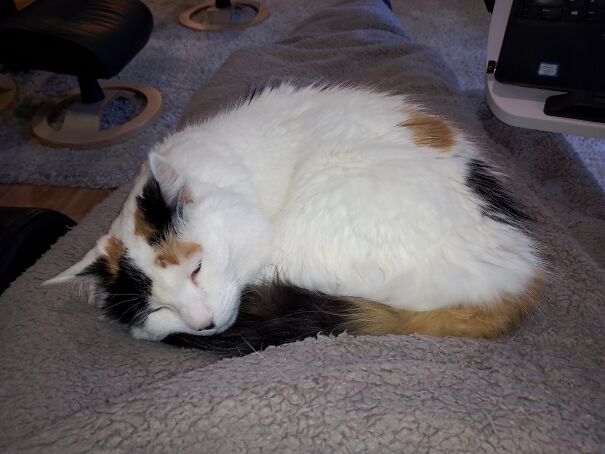
Go Bella! :D She is a gorgeous girl! My old gray lady, Wintressia, also had hyperthyroidism - she was on medication for it as well and it was easily controlled. Happily hyperT is an illness that is well-documented and easily managed with medications! My only advice would be to make sure your vet is keeping an eye on Bella's kidney values, especially her BUN and creatinine. HyperT in elderly cats can sometimes mask underlying kidney failure (CRF/CKD.) My girl Wintressia was diagnosed with kidney failure (as well as hyperT) when she was 14, but with treatment and medications she lived until she was a month shy of her 20th birthday. You're doing a great job with Bella! May you enjoy more happy years with her :)
Load More Replies...adopt, don't shop! any cat can have a beautiful and loving personality. its not about the looks, its about giving an animal a loving home
https://youtube.com/shorts/2qQFcivnpgE?feature=share like, comment, subscribe and share please
Please educate yourself about ANY breed's health problems before you adopt. Many "cute" breeds are the result of massive mutations, and these mutations often lead to severe health problems and/or pain and discomfort for the duration of the cat's life. Additionally, it's worth noting that cat breeds DO NOT work like dog breeds - meaning you don't get a "Siamese-Bengal" or a "Siengal" when you breed a Siamese and a Bengal, you get a "domestic shorthair". Mixed-breed cats are just that - mixed-breed cats. If your cat had a purebred Bengal for one parent and a domestic shorthair for the other parent, your cat technically isn't "half Bengal", it's a "domestic shorthair". Many of the "mixed breed" cats on this list are NOT officially registered breeds that are accepted by cat associations - they're just mixed-breed cats that breeders have taped a clever name onto (Like the Minuet and the Minskin.)
I came here to say this, so I'll add a little more specificity: a cosmetically small deviation is often not only present in that one small deviation. For instance: the Scottish Fold has a mutation that causes osteochondrodysplasia, or the malformation of cartilage that causes the folding of the ears. This means that these cats have malformation of ALL cartilage, not just the ears, and will cause them varying degrees of pain and discomfort throughout their lives. This goes for all Scottish folds, not just the ones that have flatter ears than the other one. Knowing this, imagine what Munshkin cats have to go through, as they have severe abnormal growth of their legs. Just because a cat doesn't show you its in pain, doesn't mean that it isn't in pain. Purebred white cats like the Khao Manee are often deaf. The list goes on. Also, a cat is not a characterless-animal that you can throw into a room and then leave alone for a few days. Invest in the happiness of your cat! Lastly: you taking good care of your pet does not justify you having an African Serval walking around your home. "But he's happy and well taken care of!" That doesn't change the fact that it's not supposed to be inside your house.
Load More Replies...As adorable as they look please ADOPT your pets from shelters. Not only are they cheaper initially, they are less likely to have a lot of the genetic disorders and health problems purebred cats have that cost a lot to treat. Plus you'll feel great for giving a pet in need a loving home!
Ima just leave this here, in case there's anyone out there that thinks you can't get a ridiculously cute and magnificently glorious floof from a shelter XD Behold Preacher, formerly "Miller" of OC Animal Care in Tustin, California! IMG-8031-1...c286a3.jpg 
they forgot bass guitarist! heres a pic: bcno-64726...520b50.jpg 
This is Bella, our Turkish Van, adopted from an RSPCA facility in 2009. She is 16.5 yo, has hyperthyroidism & is now fully recovered from an excess of calcium in her blood that necessitated a 24-hour stay on a drip in an animal hospital. She has since had anaemia due to blood in her urine, which required weekly doses of vitamin B12 for 6 weeks. We now give her an injection every 4 weeks. She takes daily medication for her hyperthyroidism & a small dose of steroids every second day. She is back to her normal weight of 3.9kg & our amazing Vet is very satisfied with her health now & thinks she may live for another 2 or 3 years without any further health issues. We spoil her rotten & she spends a good part of every day sleeping in her padded house in our living room or on my wife's lap. Occasionally, she'll condescend to sleep on me. She spends her overnights in the laundry curled up in an identical house with a heated pad underneath in the colder months Bella-asle...5acbfd.jpg 
Go Bella! :D She is a gorgeous girl! My old gray lady, Wintressia, also had hyperthyroidism - she was on medication for it as well and it was easily controlled. Happily hyperT is an illness that is well-documented and easily managed with medications! My only advice would be to make sure your vet is keeping an eye on Bella's kidney values, especially her BUN and creatinine. HyperT in elderly cats can sometimes mask underlying kidney failure (CRF/CKD.) My girl Wintressia was diagnosed with kidney failure (as well as hyperT) when she was 14, but with treatment and medications she lived until she was a month shy of her 20th birthday. You're doing a great job with Bella! May you enjoy more happy years with her :)
Load More Replies...adopt, don't shop! any cat can have a beautiful and loving personality. its not about the looks, its about giving an animal a loving home
https://youtube.com/shorts/2qQFcivnpgE?feature=share like, comment, subscribe and share please

 Dark Mode
Dark Mode 

 No fees, cancel anytime
No fees, cancel anytime 






